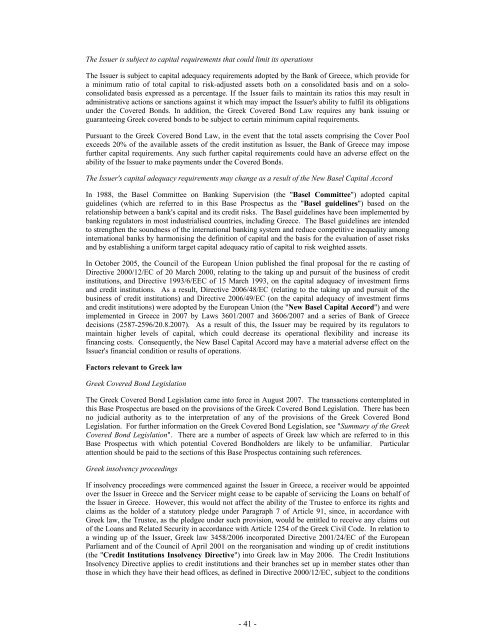MARFIN EGNATIA BANK S.A. - Irish Stock Exchange
MARFIN EGNATIA BANK S.A. - Irish Stock Exchange
MARFIN EGNATIA BANK S.A. - Irish Stock Exchange
You also want an ePaper? Increase the reach of your titles
YUMPU automatically turns print PDFs into web optimized ePapers that Google loves.
The Issuer is subject to capital requirements that could limit its operations<br />
The Issuer is subject to capital adequacy requirements adopted by the Bank of Greece, which provide for<br />
a minimum ratio of total capital to risk-adjusted assets both on a consolidated basis and on a soloconsolidated<br />
basis expressed as a percentage. If the Issuer fails to maintain its ratios this may result in<br />
administrative actions or sanctions against it which may impact the Issuer's ability to fulfil its obligations<br />
under the Covered Bonds. In addition, the Greek Covered Bond Law requires any bank issuing or<br />
guaranteeing Greek covered bonds to be subject to certain minimum capital requirements.<br />
Pursuant to the Greek Covered Bond Law, in the event that the total assets comprising the Cover Pool<br />
exceeds 20% of the available assets of the credit institution as Issuer, the Bank of Greece may impose<br />
further capital requirements. Any such further capital requirements could have an adverse effect on the<br />
ability of the Issuer to make payments under the Covered Bonds.<br />
The Issuer's capital adequacy requirements may change as a result of the New Basel Capital Accord<br />
In 1988, the Basel Committee on Banking Supervision (the "Basel Committee") adopted capital<br />
guidelines (which are referred to in this Base Prospectus as the "Basel guidelines") based on the<br />
relationship between a bank's capital and its credit risks. The Basel guidelines have been implemented by<br />
banking regulators in most industrialised countries, including Greece. The Basel guidelines are intended<br />
to strengthen the soundness of the international banking system and reduce competitive inequality among<br />
international banks by harmonising the definition of capital and the basis for the evaluation of asset risks<br />
and by establishing a uniform target capital adequacy ratio of capital to risk weighted assets.<br />
In October 2005, the Council of the European Union published the final proposal for the re casting of<br />
Directive 2000/12/EC of 20 March 2000, relating to the taking up and pursuit of the business of credit<br />
institutions, and Directive 1993/6/EEC of 15 March 1993, on the capital adequacy of investment firms<br />
and credit institutions. As a result, Directive 2006/48/EC (relating to the taking up and pursuit of the<br />
business of credit institutions) and Directive 2006/49/EC (on the capital adequacy of investment firms<br />
and credit institutions) were adopted by the European Union (the "New Basel Capital Accord") and were<br />
implemented in Greece in 2007 by Laws 3601/2007 and 3606/2007 and a series of Bank of Greece<br />
decisions (2587-2596/20.8.2007). As a result of this, the Issuer may be required by its regulators to<br />
maintain higher levels of capital, which could decrease its operational flexibility and increase its<br />
financing costs. Consequently, the New Basel Capital Accord may have a material adverse effect on the<br />
Issuer's financial condition or results of operations.<br />
Factors relevant to Greek law<br />
Greek Covered Bond Legislation<br />
The Greek Covered Bond Legislation came into force in August 2007. The transactions contemplated in<br />
this Base Prospectus are based on the provisions of the Greek Covered Bond Legislation. There has been<br />
no judicial authority as to the interpretation of any of the provisions of the Greek Covered Bond<br />
Legislation. For further information on the Greek Covered Bond Legislation, see "Summary of the Greek<br />
Covered Bond Legislation". There are a number of aspects of Greek law which are referred to in this<br />
Base Prospectus with which potential Covered Bondholders are likely to be unfamiliar. Particular<br />
attention should be paid to the sections of this Base Prospectus containing such references.<br />
Greek insolvency proceedings<br />
If insolvency proceedings were commenced against the Issuer in Greece, a receiver would be appointed<br />
over the Issuer in Greece and the Servicer might cease to be capable of servicing the Loans on behalf of<br />
the Issuer in Greece. However, this would not affect the ability of the Trustee to enforce its rights and<br />
claims as the holder of a statutory pledge under Paragraph 7 of Article 91, since, in accordance with<br />
Greek law, the Trustee, as the pledgee under such provision, would be entitled to receive any claims out<br />
of the Loans and Related Security in accordance with Article 1254 of the Greek Civil Code. In relation to<br />
a winding up of the Issuer, Greek law 3458/2006 incorporated Directive 2001/24/EC of the European<br />
Parliament and of the Council of April 2001 on the reorganisation and winding up of credit institutions<br />
(the "Credit Institutions Insolvency Directive") into Greek law in May 2006. The Credit Institutions<br />
Insolvency Directive applies to credit institutions and their branches set up in member states other than<br />
those in which they have their head offices, as defined in Directive 2000/12/EC, subject to the conditions<br />
- 41 -

















